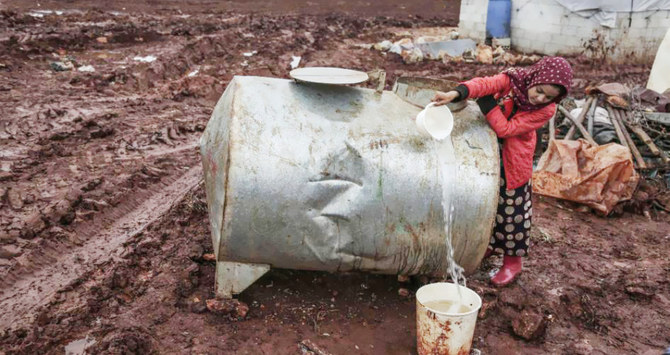ISTANBUL: Turkish President Recep Tayyip Erdogan was accused by aid and rights groups on Wednesday of risking lives during the coronavirus pandemic by restricting water supplies to nearly half-a-million Kurds in northeast Syria.
The restriction compromises humanitarian workers’ efforts to protect local communities against COVID-19, especially in terms of handwashing practices and personal hygiene, Human Rights Watch said.
On March 29, Turkey blocked the flow of water through Allouk pumping station near the Syrian town of Ras Al-Ain. The station has been controlled by Turkey and allied Syrian forces since October 2019, when Ankara launched an offensive against Syrian-Kurdish forces.
“A water shortage would certainly make a coronavirus outbreak less controllable in Syria, and drive individuals to escape to where they can get treatment and be protected, and the likely target would be neighboring countries, including Turkey,” Sara Kayyali, a Syria researcher at Human Rights Watch, told Arab News.
Allouk had been providing water to about 460,000 people in Syria’s Al-Hasakeh governorate, including those living in displacement camps such as Al-Hol and Areesheh.
UNICEF warned that the “interruption of water supply during the current efforts to curb the spread of the coronavirus disease puts children and families at unacceptable risk.”
Human Rights Watch said:
“The Turkish authorities should do everything they can to immediately resume supply to these
communities.”
The group is concerned that the water shortage may lead to a greater risk of coronavirus contagion in the region.
Faruk Logoglu, a retired Turkish diplomat, called for the introduction of “corona diplomacy” by Ankara in its relations with Syria, which does not have enough hospitals, ventilators, medicines and medical equipment. “Contacts should be initiated” by Turkey with the Syrian government “to develop a joint plan of action to fight the pandemic,” he said.
Some regions of Syria, especially opposition-held Idlib province, are a ticking time bomb, with an insufficient number of coronavirus
test kits.




















